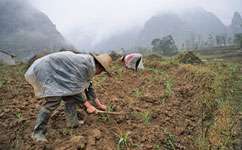Environmental index could save rural communities

A new approach to environmental monitoring could avert ruin for some of the world's poorest communities.
By creating the world's first long-term record of ecosystem health, Chinese and UK researchers have identified where specific social and economic policies have damaged the environment in eastern China.
The work shows that wealth generation over recent decades is damaging essential ecosystem services on which the poorest rely - things like food, fuel, and clean water.
What makes this approach different is the historical perspective. By revealing trends over decades researchers can separate natural causes of change from man-made ones, and set benchmarks for ecosystem health that will inform environmental and social policies.
Identifying what causes these trends will help policy-makers prioritise their actions to improve the balance between short-term economic growth and long-term poverty alleviation.
The research team, led by Professor John Dearing from the University of Southampton, found their environmental evidence in sediment cores taken from two lakes in the lower Yangtze basin, covering the period 1800-2006.
The researchers looked at several indicators of the health of the surrounding ecosystem, contained in the sediments – for example, pollen remains indicate the diversity of plant species in the region while metal content is a sign of air quality.
They then compared evidence for ecosystem services like soil stability, air and water quality with socio-economic and climate records so they could see if different approaches to economic development or agriculture had benefited or harmed these key ecosystem services.
For example, intensive agriculture has lifted many Chinese rural communities out of poverty over the last 30 years. But the irrigation, mechanisation and fertilisers that came with it have degraded soils badly and there is already evidence for declining water quality.
"Economic development and an increase in regional wealth are clear trade-offs for the decline in regulating services over four decades," write the researchers in the journal PNAS.
That decline is a distinct long term threat to the resources on which local livelihoods depend.
The historical perspective reveals gradual changes that might be missed over shorter periods. It also shows that human activity doesn't simply cause linear change – it can lead to tipping points beyond which damage to ecosystems becomes irreversible.
To unravel some of the complexity and make the evidence more accessible, the team has developed a 'regulating services index' – an at-a-glance indicator of environmental health.
In the Yangtze basin, over the past 40 years of population growth, intensive agriculture and industrialisation, that index has halved.
"Every day we see a financial index like the FT100 or Dow Jones being used to monitor the health of an economy over time – here we realised that palaeoecological records could provide the basis for a regional ecosystem service index, especially for the regulating services which are often lacking long-term monitored data," comments Dearing.
The issues are complex and difficult comprises are needed. For example to improve water quality in the long term it might be necessary to limit the use of fertilizers, which could mean lower yields for farmers now. But doing nothing could terminally damage water sources, which would affect the quality of life across all rural communities.
The index does not provide the answers. But by showing the long-term effects that specific social and economic policies are having it will help policy-makers prioritise the most urgent problems, and see what strategies are working well.
The project team is developing new models that can be used to apply these principles around the world.
More information: John A Dearinga, et al. Extending the timescale and range of ecosystem services through paleoenvironmental analyses, exemplified in the lower Yangtze basin. 2012. PNAS doi: 10.1073/pnas.1118263109
The project 'Poverty and ecology: developing a new evolutionary approach', is funded by ESPA – Ecosystem Services for Poverty Alleviation – which is part of the Living With Environmental Change partnership, along with the National Basic Research Program of China (973 program, 2012CB956100).
Journal information: Proceedings of the National Academy of Sciences
Provided by PlanetEarth Online
This story is republished courtesy of Planet Earth online, a free, companion website to the award-winning magazine Planet Earth published and funded by the Natural Environment Research Council (NERC).















